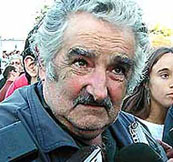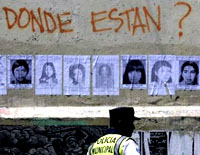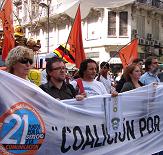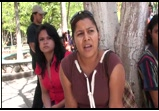|
Written by James J. Brittain
|
|
Tuesday, 27 October 2009 |
 To prolong influence over Colombia, every US administrations from Nixon to Obama has embraced a ‘war on drugs,’ or more recently a ‘war on terror,’ as a means to deploy counterinsurgency campaigns to silence antagonistic sectors of said population. It is increasingly clear, when concerning the recent actions of Bogotá and Washington to facilitate seven fortified bases controlled by the United States on Colombian territory, that both states have coordinated a strategic alliance to militarize the region, not simply one country. To prolong influence over Colombia, every US administrations from Nixon to Obama has embraced a ‘war on drugs,’ or more recently a ‘war on terror,’ as a means to deploy counterinsurgency campaigns to silence antagonistic sectors of said population. It is increasingly clear, when concerning the recent actions of Bogotá and Washington to facilitate seven fortified bases controlled by the United States on Colombian territory, that both states have coordinated a strategic alliance to militarize the region, not simply one country. |
|
|
Written by Laura Carlsen, Photos for Upside Down World by Crystal Vance
|
|
Tuesday, 27 October 2009 |
 At midnight on Octover 10, President Felipe Calderon issued an executive decree to liquidate the company and its union, the Mexican Electrical Workers Union (Sindicato Mexicano de Electricistas—SME), one of the strongest and most vocal independent unions in the nation. Ironically, the current economic crisis provided the Calderon Administration its strategic opportunity to cut the underfunded company and malign the union. At midnight on Octover 10, President Felipe Calderon issued an executive decree to liquidate the company and its union, the Mexican Electrical Workers Union (Sindicato Mexicano de Electricistas—SME), one of the strongest and most vocal independent unions in the nation. Ironically, the current economic crisis provided the Calderon Administration its strategic opportunity to cut the underfunded company and malign the union.
|
|
|
Written by Shamus Cooke
|
|
Monday, 26 October 2009 |
 Under Bush, immigrant communities lived in a constant state of fear. This scenario has changed only slightly under Obama, and some say for the worst. Obama’s campaign promise of undoing Bush’s immigration strategy was, like nearly every other promise he’s made, a blatant lie. Instead, he’s adopted the “enforcement first” immigration approach: John McCain’s campaign platform which Obama once mocked. Under Bush, immigrant communities lived in a constant state of fear. This scenario has changed only slightly under Obama, and some say for the worst. Obama’s campaign promise of undoing Bush’s immigration strategy was, like nearly every other promise he’s made, a blatant lie. Instead, he’s adopted the “enforcement first” immigration approach: John McCain’s campaign platform which Obama once mocked. |
|
|
Written by Darío Montero
|
|
Friday, 23 October 2009 |
 José Mujica |
|
|
Written by Colm McNaughton
|
|
Thursday, 22 October 2009 |
 The war in Guatemala has never ceased. While the Peace Accords signed in 1996 demobilized some combatants and weapons - the killing, raping and torturing continues unabated. In 2009 the homicide rate for Guatemala, with a population of 13 million, is about 8,000 per year. Of these 8,000 murders approximately 10 percent are women and girls. The war in Guatemala has never ceased. While the Peace Accords signed in 1996 demobilized some combatants and weapons - the killing, raping and torturing continues unabated. In 2009 the homicide rate for Guatemala, with a population of 13 million, is about 8,000 per year. Of these 8,000 murders approximately 10 percent are women and girls. |
|
|
Written by Jamie Way
|
|
Monday, 19 October 2009 |
|
 Despite the repeal of Peruvian President Alan Garcia’s controversial executive decrees, it appears as though the Amazon is still very much for sale. Earlier this year, violent demonstrations erupted over Garcia’s decrees that attempted to open Peru to foreign (read: extractive) investment in accordance with its free trade agreement with the U.S. Although the violence has resided for the time being, the larger underlying issues are far from resolved. Moreover, the neoliberal tendency of taking advantage of indigenous resources is evolving into more complex and duplicitous forms. Despite the repeal of Peruvian President Alan Garcia’s controversial executive decrees, it appears as though the Amazon is still very much for sale. Earlier this year, violent demonstrations erupted over Garcia’s decrees that attempted to open Peru to foreign (read: extractive) investment in accordance with its free trade agreement with the U.S. Although the violence has resided for the time being, the larger underlying issues are far from resolved. Moreover, the neoliberal tendency of taking advantage of indigenous resources is evolving into more complex and duplicitous forms.
|
|
|
Written by Marie Trigona
|
|
Monday, 19 October 2009 |
 Media laws in Argentina favoring big corporations over small community groups were changed this month recently with a new law which will radically transform media ownership regulations, and possibly open airwaves to community groups across the country. Media conglomerates have been fighting the bill in an attempt to preserve their control over news and information. The passage was met with celebrations outside of congress, where thousands converged in support of the law. Media laws in Argentina favoring big corporations over small community groups were changed this month recently with a new law which will radically transform media ownership regulations, and possibly open airwaves to community groups across the country. Media conglomerates have been fighting the bill in an attempt to preserve their control over news and information. The passage was met with celebrations outside of congress, where thousands converged in support of the law. |
|
|
Written by James Suggett
|
|
Thursday, 15 October 2009 |
|
 On Tuesday, the day after the national government granted more than 40,000 hectares of land to Yukpa indigenous communities in northwestern Venezuela, assassins attacked the community of Yukpa chief and indigenous rights activist Sabino Romero, killing two and injuring at least four. On Tuesday, the day after the national government granted more than 40,000 hectares of land to Yukpa indigenous communities in northwestern Venezuela, assassins attacked the community of Yukpa chief and indigenous rights activist Sabino Romero, killing two and injuring at least four.
|
|
|
Written by Johannes Wilm
|
|
Thursday, 15 October 2009 |
 In this documentary, Johannes Wilm shows his conversations with students fighting against the military coup in Honduras. Wilm went to Honduras to film the oppositionj to the coup in early August 2009, and he happened to be there on the 5th of August, when police clashed with 3000 students in the National Autonomous University of Honduras (UNAH). In this documentary, Johannes Wilm shows his conversations with students fighting against the military coup in Honduras. Wilm went to Honduras to film the oppositionj to the coup in early August 2009, and he happened to be there on the 5th of August, when police clashed with 3000 students in the National Autonomous University of Honduras (UNAH).
|
|
|
Written by Jamie Way
|
|
Wednesday, 14 October 2009 |
 An embittered U.S. policy toward Cuba has extended the reach of this grudge to the rest of the region. Antiquated legislation originally pertaining to Cuba has not only been updated and maintained, but has been applied to the detriment of other countries, including Nicaragua. Nicaragua has given out a significant portion of its annual budget in government bonds to U.S. claimants since 1990 as remuneration for land seized under agrarian reform programs. An embittered U.S. policy toward Cuba has extended the reach of this grudge to the rest of the region. Antiquated legislation originally pertaining to Cuba has not only been updated and maintained, but has been applied to the detriment of other countries, including Nicaragua. Nicaragua has given out a significant portion of its annual budget in government bonds to U.S. claimants since 1990 as remuneration for land seized under agrarian reform programs. |
|
|
Written by Dominique Jarry-Shore
|
|
Wednesday, 14 October 2009 |
 Mariano Abarca |
|
|
Written by Kara Newhouse and Laura Taylor
|
|
Thursday, 08 October 2009 |
 Even as tireless Honduran protesters approach their 100th day of resistance, continuing to avoiding police tear gas and attend funerals of slain resisters, some facets of quotidian Tegucigalpa life continue under the dictatorship. Yet the literal writing on the walls deny the state of calm that the coup leaders claim exists and expose the state of exception that they impose. These photos capture the ongoing conversations in a shrinking space for expression. Even as tireless Honduran protesters approach their 100th day of resistance, continuing to avoiding police tear gas and attend funerals of slain resisters, some facets of quotidian Tegucigalpa life continue under the dictatorship. Yet the literal writing on the walls deny the state of calm that the coup leaders claim exists and expose the state of exception that they impose. These photos capture the ongoing conversations in a shrinking space for expression. |
|
|
Written by Marc Becker
|
|
Thursday, 08 October 2009 |
 On
April 26, 2009, Rafael Correa won re-election to the Ecuadorian
presidency with an absolute majority of the vote. The victory
cemented Correa’s control over the country as the old political
establishment appeared to be in complete collapse. But social movements in Ecuador have
become increasingly critical of his populist positioning. Despite
Correa’s claims that under his administration the long dark night of
neoliberalism is finally over, Indigenous movements have condemned him
for continuing basically these same policies through large-scale
mineral extractive enterprises. On
April 26, 2009, Rafael Correa won re-election to the Ecuadorian
presidency with an absolute majority of the vote. The victory
cemented Correa’s control over the country as the old political
establishment appeared to be in complete collapse. But social movements in Ecuador have
become increasingly critical of his populist positioning. Despite
Correa’s claims that under his administration the long dark night of
neoliberalism is finally over, Indigenous movements have condemned him
for continuing basically these same policies through large-scale
mineral extractive enterprises.
|
|
|
Written by Jennifer Moore
|
|
Wednesday, 07 October 2009 |
 After a week of marches and road blockades, Ecuador's national
indigenous movement and the government of President Rafael Correa have
initiated talks. On Monday afternoon, a delegation of about
150 representatives from the three regional organizations of the
Confederation of Indigenous Nationalities of Ecuador (CONAIE) attended
a meeting with the President and his cabinet in Quito. After a week of marches and road blockades, Ecuador's national
indigenous movement and the government of President Rafael Correa have
initiated talks. On Monday afternoon, a delegation of about
150 representatives from the three regional organizations of the
Confederation of Indigenous Nationalities of Ecuador (CONAIE) attended
a meeting with the President and his cabinet in Quito.
|
|
|
Written by Raúl Zibechi
|
|
Tuesday, 06 October 2009 |
 If Evo Morales had not awarded him the most important distinction given by the state, the life of Constantino Lima would only be known to his friends and companions, even though his personal life is among those that epitomize the outstanding history of the Aymara people. If Evo Morales had not awarded him the most important distinction given by the state, the life of Constantino Lima would only be known to his friends and companions, even though his personal life is among those that epitomize the outstanding history of the Aymara people. |
|
|
Written by Sebastián Lacunza
|
|
Friday, 02 October 2009 |
 Civil society groups in Argentina are concerned that private
security firms, which have mushroomed to 850 in Greater Buenos Aires,
employ many former police officers and troops who played an active role
in the political repression during the 1976-1983 military dictatorship. Civil society groups in Argentina are concerned that private
security firms, which have mushroomed to 850 in Greater Buenos Aires,
employ many former police officers and troops who played an active role
in the political repression during the 1976-1983 military dictatorship.
|
|
|

